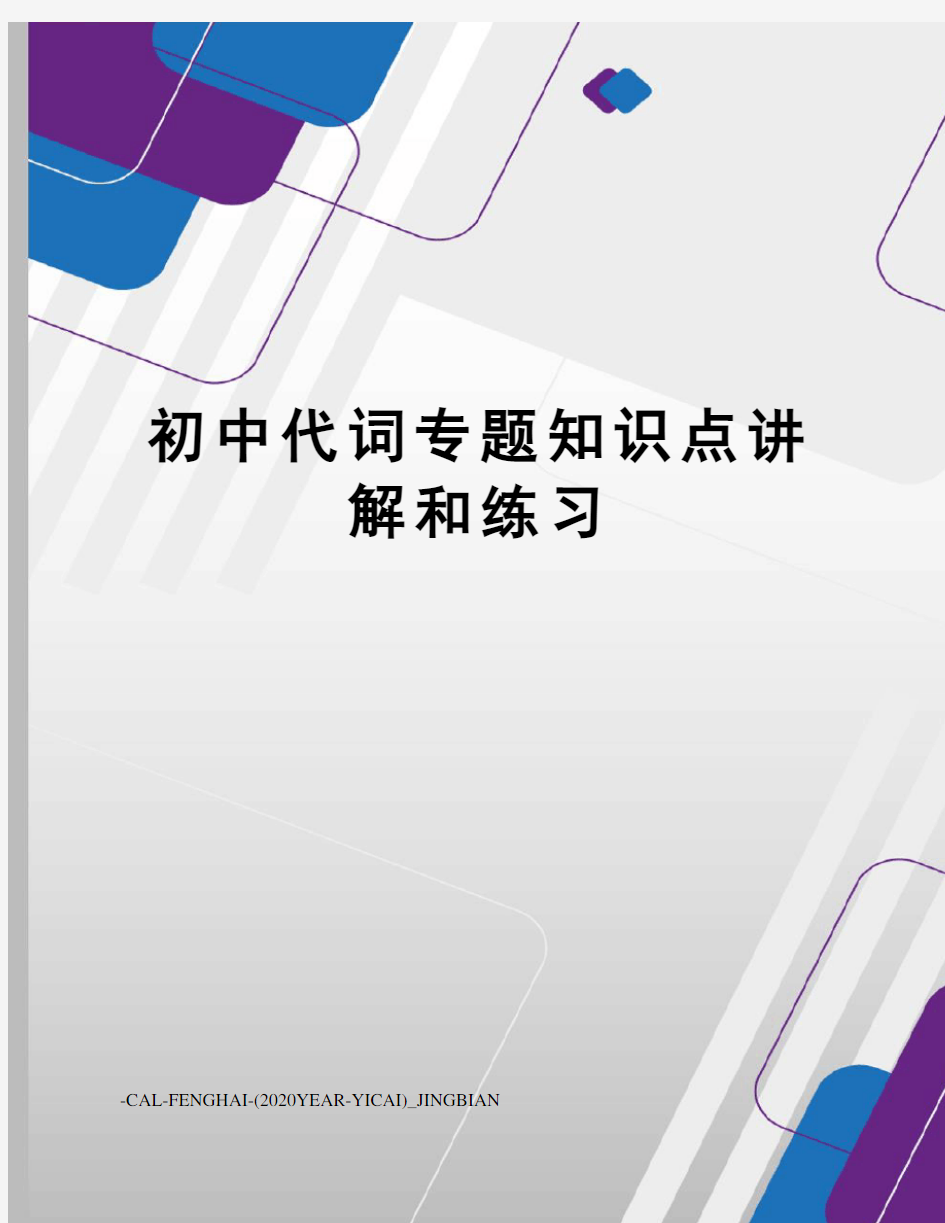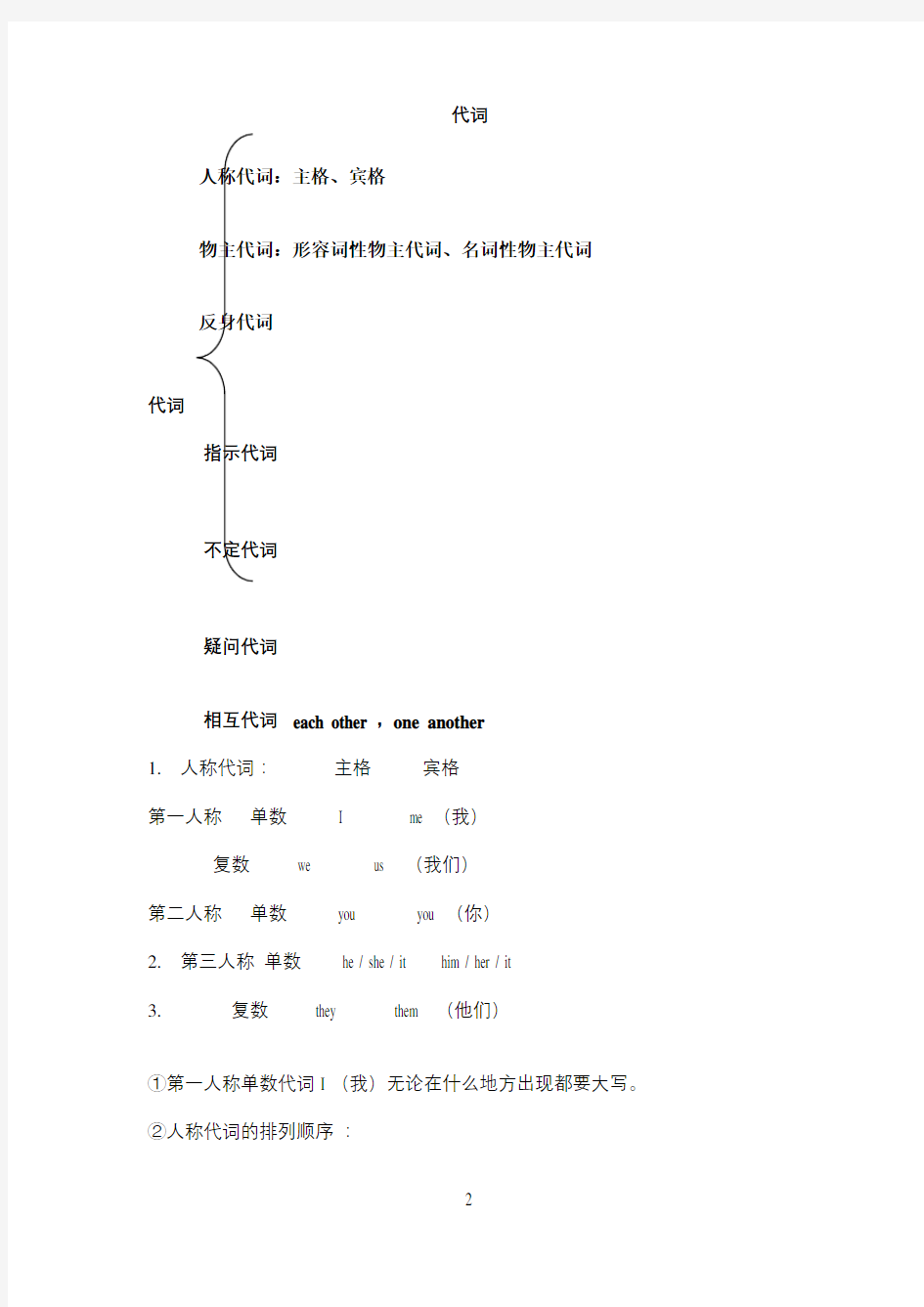初中代词专题知识点讲解和练习


初中代词专题知识点讲
解和练习
-CAL-FENGHAI-(2020YEAR-YICAI)_JINGBIAN
代词
人称代词:主格、宾格
物主代词:形容词性物主代词、名词性物主代词
反身代词
代词
指示代词
不定代词
疑问代词
相互代词 each other ,one another
1.人称代词:主格宾格
第一人称单数 I me (我)
复数 we us (我们)
第二人称单数 you you (你)
2.第三人称单数 he / she / it him / her / it
3.复数 they them (他们)
①第一人称单数代词 I (我)无论在什么地方出现都要大写。
②人称代词的排列顺序:
二,三,一 (单数)
一,二,三(复数)
eg : you , he and I ( 你,他,我)
we , you and they (我们,你们,他们)
③人称代词作主语时要用其主格
eg: they are nurses.
she is a barber.
?动词后用宾格
? eg : I help him and he helps me
? 2. 介词后用宾格
? eg : Jim takes good care of me
Ex :
1.Miss Zhang teaches ___ math.B
A. we
B. us
C. our
D. ours
2. ___ like playing soccer with ___.C
A. Them , me
B. They, I
C. They , me
D. Them,I
3. Tom is a new student. ___ knew none of ____.A
A. He, us
B.He , we
C. Him , us
D. His, we
4. You can sit between____.B
A. he and I
B. him and me
C. me and him
5. ___ all come here early.C
A. Them
B. She
C. We
D. Us
1. ___ am a student . Jim is my brother .
___ is a student ,too. Both of ___ like English.
2. Mary is an English . ___ teaches us English.
3. His mother asked ____ to look after his sister.
4. ___ are students . So ___must study hard (我们)
5. Can you look after ____ (他们)
6. My father is very kind .
__ likes talking to __ (我们).
7. Do you know where Lucy and Lily are .
___ (我)can’t find ____(他们)
8. ____ am here. Can you see ___ (我)
9. Does ___(她)like ____ (它)
10 . ____(他) plays basketball better than ____(我)
二、物主代词:“的”
形容词性物主代词名词性物主代词第一人称单数 my mine (我的)
复数 our ours (我们的)
第二人称单数 your yours (你的)
复数 your yours (你们的)
第三人称单数 his / her / its his/ hers / its(他的)复数 their theirs (他们的)
用法:
形容词性物主代词+ 名词
名词性物主代词相当于名词,
可作主语,表语和宾语
Eg : This is my book = This book is mine
That is your pen , mine is in my bag.
this is Lucy‘s coat,yours is different from hers
1. ___ room is better than ____.C
A. They , us
B. Their , our
C.Their, ours
2. Is this ____ sister No, She is ____ sister.A
A. your , his
B. your, mine
C. his , mine
3. She is ___ English teacher . She teaches __ well.B
A. our, ours
B. our , us
C. their , they
4. Must ___ go to ___ office now A
A. we , his
B. he , you
C. they, yours
5. You must bring ___notebook to the school.B
A. you
B. your
C.yours
6. The red bag is ___ .___ is white.A
A. his , Mine
B. him, My
C. mine ,Him
7. Can ___ use ___ bike B
A. I , you
B. I , your
C. me, your
三、反身代词:……自己
第一人称单数 myself (我自己)
复数 ourselves (我们自己)
第二人称单数 yourself (你自己)
复数 yourselves (你们自己)
第三人称单数 himself / herself / itself (他自己)
复数 themselves (他们自己)
用法:与主语的人称一致
Eg : I can teach myself English .
We enjoyed ourselves .
常用词组:
1.Help oneself to sth 请自便 / 别客气
You can help yourselves to the cake , children.
2. enjoy oneself 玩得开心=have a good time
3.teach oneself sth = learn sth by oneself 自学 We can teach ourselves English.
= We can learn English by ourselves .
4.look after oneself 照顾自己
5. leave one by oneself 把某人单独留下
She can’t leave Tom by himself .
6.by oneself 靠自己
7.dress oneself 自己穿衣服
8. say to oneself 自言自语 9. lose oneself in 沉迷于
https://www.360docs.net/doc/ca16170866.html,e to oneself 苏醒11.be not oneself 不舒
12.kill oneself 自杀 13.introduce oneself 自我介绍
14.behave oneself规矩 15.absent oneself 缺课/缺勤 16.devote oneself to 专心于17. apply oneself to 专心致志 18. adapt oneself to 适应于 19. Dress oneself 自己穿衣服
Ex.
1.Lucy, can you do it by _____
2.My mother said she could look after ____.
3. We must finish it by _____.
4. They came to see the house ______ yesterday.
5. Lilei can dress _______ and wash ____ .
6. My parents enjoy_____ every day.
7. Did he hurt _______
8. You can pick the apple by ______, John.
9. Miss Liu taught ____ Japanese .
10. The twins correct the mistakes by ___ .
11. Who teaches ___ English He teaches ___.
A. himself ,himself
B. him, himself
C. his , himself
四、指示代词
1、指示代词的形式:单数:this , that
复数:these , those
如:This is my watch. That is his watch .
These are my books .Those are his books.
2、打电话时,常用“that”询问对方是“谁”,
用“this”介绍自己。
如:--Hello , Is that Lucy
-- Hello , this is Lucy.
五、疑问代词
指人:who , whom , whose ,which
指物:what , which
指时间: when
指地点: where(疑问副词)
指方式:how(疑问副词)
Eg : Who are you talking to
Whose book is this
Where have you been
六、不定代词
1.常见的不定代词有:some , any , one, each , every , no , none , all , both ,either , neither ,
many , much , a few , a little , other ,
another ,the other 等
2.形容词修饰something , anything , nothing ,
somebody , anybody , nobody, everything,
everyone , everybody等不定代词时,放在后面。如:Is there anything important in today’s
newspaper
There is nothing wrong with your bike.
it 的用法
1、指时间、天气或距离等
如:It’s eight o’clock now . It’s time for class .
It’s getting hotter and hotter.
It’s five miles from my home to school .
2、指谈话双方都知道的或都不知道的人或事如:--Who is knocking at the door
--It must be Lilei. He said he would come tonight . --Who is it
-- It’s me.
3、做形式主语或形式宾语
如:It’s very important to study English well .
We found it hard to finish the work on time. 1.adj 修饰不定代词时, 形容词要放在不定
代词的后面
eg, something different
nothing interesting
2. many + 可数名词
eg, many books / pens / people
much+不可数名词
eg, much water / money / milk
3. all 是在三者或三者以上
eg, Lily, Lucy and I are all students.
We all stand here .
当表示两者都用 both
eg, Lily and Lucy are both clever.
My sister and I both go to school .
4. little 和 a little, few 和 a few
a little + 不可数名词一点点 , 肯定
little + 不可数名词几乎没有 , 否定
eg, There is _____meat in the fridge.
Let’s go and get some .
I am very thirsty. Luckily , there is
_________tea in the teapot .
I have learned English for one year. I can speak _________ now .
5, every 和 each后都可以接单数可数名词
eg, every / each teacher
但 each则是指两者或两者以上中的每一个,且
可用于each of 结构,every 表示三个或三个以上中的每一个,且不可以用 of 结构.
eg, Every boy has a bike .
--- Each boy has a bike .
--- Each of the boys has a bike.
eg, on _______side of the street
6, some 用于肯定句,any用于否定句和疑问句
eg, There is some water in the cup , but
not any milk .
Is there any news today
但在疑问句中,当说话者希望对方做肯定回答时
要用 some , 而不是 any
eg, ---May I have some paper , please
---Sure. Here you are .
7, either: 任意一个(两个中选一个)
eg,---Would you like tea or coffee
--- Either is ok, I don’t mind .
构成either … or … 词组或者…或者…
Either you or your brother is here .
--Either your brother or you are here .
Either you or your brother works here .
--Either your brother or you ______ here .
neither (两个中)一个都没有
---Would you like some tea or coffee
---Neither . I like orange juice .
neither …nor … 既不、、、也不、、、
Neither you nor your brother is in Row 3.
--Neither your brother nor you are in Row 3
Neither he nor his sisters have a car.
--Neither his sisters nor he ______a car.
8, another: 另一个,+单数可数名词
other: 另外的,其余的 + 复数名词, 泛指
the other:另外的,其余的 + 复数名词, 特指
others: 另外的(人或物), 泛指
the others: 另外的(人或物), 特制
此外,固定词组one … the other …
一个、、、另一个、、、
eg, Of the two boys , one is my brother ,
__________ is his brother .
Of the three teachers , one is from America , ________ two are from England . Would you like ________cup of tea
1.-- Is this your dictionary B
-– No, ____ is in my bag.
A. hers
B. mine
C. yours
2. –-- We have to be quick. The train A
starts at 10:35.
-–Don’t worry. There is ____ time to go.
A. a little
B.few
C. little
D. any
3. We’ve got two TV sets, but _____ works well.D
A.any
B. both
C.either
D. neither
4. –How many of these books have you read?
--_____ of them, every one.
A. Many
B. Some
C.All
D. None
5. –--- Did your parents go to the film
yesterday evening
---–No, we______ stayed at home
watching TV.
A.both
B. all
C. either
D. none
6.Boys and girls! Please help ________ to
some apples.
A. you
B. yourself
C. yourselves
4. My parents _________ teachers. B
They work hard.
A. are all
B. are both
C. both are
5.Listen! I have _____ to tell you.B
A. important something
B. something important
C. anything important
D, nothing important
6.I have two friends. One is a farmer,
__________is a teacher.B
A. another
B. other
C. the other
7.You look thirsty. Would you like to ___________water.
A. any
B. some
C. a few
8.Look! There are so _____ students in the field.
A. much
B. little
C. many
9.There are some trees on _____ sides of the road.
A. both
B. either
C. neither
10. The boy is looking for _______mother.
A. her
B. he
C. his
11,---Is there __________ in the room
--- No, __________is in .
A, anybody, nobody
B, anybody, everybody
C, somebody, anybody
12, ______do you have for lunch
A, Which B, Where C, What
13, Terry enjoyed ______very much .
A, he B, him C, himself
14, The man is ________Chinese teacher .
A, Tom and Tim B, Tom’s and Tim’s
C, Tom and Tim’s
二.None,nothing,nobody(no one)的区别
1. None 既可指人也可指物,且表特指概念,常回答how, many, how much,引导的疑问句,nothing只能指物,且表泛指概念,常用来回答what引导的疑问句。如:
-How much money do you have?
-None
What are you doing now?
-nothing v
2. none 常与前面的“some/any/every+名词”连用;nothing 常与前面的something/anything/everything连用;no one 常与前面的
someone/somebody/everyone/everyone/anyone/anybody连用。
If I had some money, I would lend him some, but unfortunately, I have none.
3. none后面跟of 短语,而something /anything/everything/nothing和someone/anyone/everyone/no one却不能。
As we were asleep,none of us heard the sound.
4.any和every的区别
“any+名词表示(三个或三个以上中的)任何一个”,即:这个或那儿或哪个““every+名词”表示“(三个或三个以上中的)每一个”,即这个和那个和哪个。
Not any 表示全部否定,而“not every+名词”表示部分否定,
5.each ,every的区别
each 强调“个体”,可作代词和限定词,指“两个或两个以上中的每一个”。
Every 强调“全体”,只能作定语,指“三个或三个以上中的每一个”。Each作为同位语时,不影响谓语动词的形式,不可用not each表示部分否定。
Each of my children goes to a different school.
Each of the tickets costs 10dollars.
=the tickets cost 10dollars each
=the tickests each cost 10 dollars.(each 作同位语)
Every man is not honest = not every man is honest.
6.全部否定或部分否定
All ,both,everyone,everybody,everything以及“every+名词”都表示全部肯定;
No one,none,nobody,nothing,not…any以及“no+名词”都表示全部否定。
当not出现在含有表示全部肯定的不定代词的句子中时,不管not在它们之前还是在它们之后都表示全部否定。此外not与总括性副词如everywhere,always,wholly,altogether等连用时也表示部分否定。
Not all of them smoke=all of them don’t smoke他们当中不是所有的人都抽烟。
All of the boys are clever,but none of them can work out this problem.
Such a thing can’t be found every where.
这种事并非到处可见。
1.While I agree with most of what you said, I don’t agree with _______.
a. something
b.anything c everything d nothing
2.I haven’t read ______of his books,but judging from the one I have read. I
think he will made a very promising writer.
a. any
b. none
c. both
d. either
7.one,ones,the one,the ones, that, those的区别
one 用来替代前面出现的泛指的单数名词,相当于“a/an+单数名词”;ones用来替代前面出现的泛指的复数名词;the one用来替代前面的特指的单数名词。有时可用that 替代(尤其是在有后置定语的情况下);the ones 用来替代前面的特指复数名词,有时可用those替代(尤其是在有后置定语的情况下);that用来替代前面出现的特指的单数名词或特指的不可数名词相当于“the+单数可数名词/不可数名词)。
